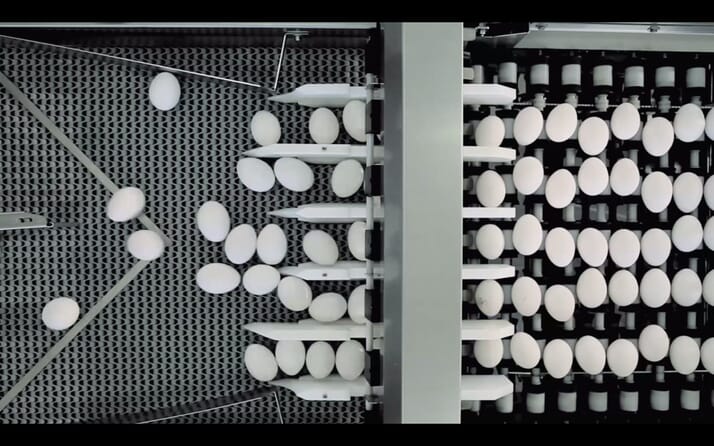RIO DE JANEIRO, BRAZIL – For 14 years the Paraná-based Globobiotech has been producing eggs in a farm that operates as a fully controlled laboratory.

The production of the flu vaccine in Brazil depends on chicken eggs. Just as the country is one of the global leaders in agribusiness, the Butantan Institute is a world reference in the use of eggs with bird embryos for the production of vaccines. It is this very technique that will be used in the development of a new vaccine against the coronavirus, the Butanvac.
The production of vaccines from chicken eggs in Brazil dates back to the 1930s, when the Oswaldo Cruz Foundation began producing the yellow fever vaccine. According to Natalia Pasternak, microbiologist and president of Questão de Ciência Institute, the technique that uses embryonated eggs allowed for a leap in vaccine development in the country.
“It is a cheaper way to propagate microorganisms. To do this, you need some kind of cell culture. You can do it with mammalian cell culture, with bacterial culture, or with the egg. The egg is a good cell too. At the Butantan we have the expertise and the structure set up and certified, in addition to a whole trained team,” she explains.
But before the egg becomes a vaccine in the laboratory, there is a whole production and transportation chain of the so-called Specific Pathogen Free Eggs. Paraná’s Globobiotech is responsible for 70% of egg supply to the Butantan, with 100 million units per year.
The company is the biotechnology branch of Globoaves group, headquartered in Cascavel, western Paraná, specialized in breeding stock for the production of fertile eggs, which will produce the chicks for conventional farms.
The group’s total turnover is R$1.2 billion (US$226 million) per year. The development of eggs for vaccine production corresponds to 10% of the business, and the amount paid per unit is not disclosed for contractual reasons.
The partnership between the Butantan and Globobiotech began in 2007, when the company was sought by the São Paulo institute to create special eggs for vaccine development, as explained by Roberto Kaefer, the company’s founder and director.
“When we started, we had nothing to produce a special egg in Brazil. We visited Europe to learn about the processes and understand what was needed to produce controlled eggs. At that time, the Ministry of Agriculture did not even have a regulation for such development,” he recalls.
To produce this volume, the company built four centers in the state of São Paulo – located in the municipalities of Itirapina and São Carlos – over a 14-year period, completely different from conventional farms. In the case of controlled egg production, the hen and the cock must come first. Kaefer explains that there is a genetic selection. Globobiotech works with birds with white and brown plumage, called Novogen and Hisex breeds.
There are about 550,000 animals producing eggs for up to 60 weeks for the Butantan Institute. By way of comparison, chickens that produce eggs for consumption lay them for about 100 weeks.
The birds are kept in a kind of laboratory where everything is controlled. The air, for example, is 100% renewed every 3 minutes. Nests, feeders, and drinkers are automated. “There is a structure built for this purpose. The roof is isothermal, and there is a machine for automated egg collection,” explains Kaefer.
The farms are located in isolated areas, surrounded by natural reforestation health barriers, with strict access control, restricted to employees and a strict health protocol. All people working at the site undergo several stages of decontamination before entering.
The selected eggs undergo a test called ovoscopy to check if there is a healthy embryo inside, still in its initial development stage, before being sent to the Butantan. About 65% pass this quality control stage. In the case of the influenza vaccine, deliveries are made between September and April.
Even transportation needs to follow strict rules. Roberto Kaefer says that trucks with cold storage were specially adapted to the company’s needs. He calls these vehicles “moving incubator machines.” These adjustments include temperature control (around 30°C) and ensuring that the truck has 70% humidity.
When the egg reaches the Butantan Institute
The manufacturing process of both vaccines – influenza and Covid-19 – is similar. Upon arrival at the Butantan, the eggs undergo quality control procedures. After that, they are kept in a fully isolated area of the laboratory. The eggs receive a modified version of the virus that takes up to 72 hours to multiply. In the next step, the liquid containing this large virus concentration is removed.
Only then do the steps of purification, clarification, filtering, and chemical inactivation of the virus occur, giving rise to the so-called API (Active Pharmaceutical Ingredient), which is processed and bottled. Each egg can produce up to 3 vaccine doses.
“In approximately 11 days we will have the monovalent finished, which is then stored in a cold chamber,” says Douglas Gonçalves de Macedo, production manager of the influenza vaccine manufacturing building at the Butantan.
The Butanvac has not yet been granted authorization by the Brazilian Health Regulatory Agency (ANVISA) to conduct phase 2 and 3 human trials. Nevertheless, the vaccine’s production process has already started. Globobiotech made a first delivery of 520,000 eggs to start production. According to the Butantan director Dimas Covas, in this first stage, which runs until May 18th, 6 million vaccine doses will be produced.
Source: Exame

